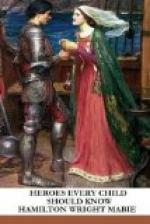So there was delay after delay, much talk to no purpose, and the hearts of men, both on one side and on the other, growing more hot with anger from day to day. And there was also the need which increased from day to day, as, indeed, it needs must, for the Christians to be about the business on which they came. They had taken the town of Acre, but that was but the beginning of their enterprise, for they had to conquer the whole land. And how could the army march with a whole multitude of prisoners in their hands? It would need no small number of men to keep watch over them, lest they should escape, or, what was more to be feared, do an injury to the army. What could be worse in a doubtful battle than that there should be these enemies in its very midst? I set these things down because I would not do an injustice to the English King, whom I have always held as one to be greatly admired. Nevertheless I say again, that in the matter of the prisoners he did a shameful deed. For on the 20th day of August he commanded that all the prisoners that were in his hands, whether they had been taken in battle, or delivered up as hostages for the fulfilment of the covenant, should be led out of the city and slain. These were in number between two and three thousand. Some the King kept alive, for whom, as being of high nobility and great wealth, he hoped to receive a ransom; others were saved by private persons, a few for compassion’s sake; and others in the hope of gain. But the greater part were slain without mercy, the soldiers falling upon them, without arms and helpless as they were.
It was soon made plain to all that the spirit of the Caliph and his Turks was not broken by the losing of Acre. Rather were they stirred up by it to more earnestness and courage; nor did they forget how their countrymen had been cruelly slaughtered. For a time they were content to watch the King’s army as it went on its way, taking such occasion as offered itself of plundering or slaying. If any lagged behind, falling out of the line of march by reason of weariness, or seeking refreshment on the way, as when there was a spring of water near to the road, or a vineyard with grapes—’twas just the time of the ripening of grapes—then the Turkish horsemen would be upon him. Such loiterers escaped but seldom. And for this business the Turks had a particular fitness, so quickly did they come and depart. The Christian knights were clad in armour, a great defense, indeed, against arrows and stones, but a great hindrance if a man would move quickly; the horses also had armour on them. Why do they set men on horses but that they may go speedily to and fro as occasion may call? but these knights are like to fortresses rather than to riders. A man on foot can easily outrun them; as for the Turks who rode on horses from the desert—than which there is no creature on earth lighter and speedier—they flew from the Christian who would pursue them, as a bird flies from a child who would catch it.




